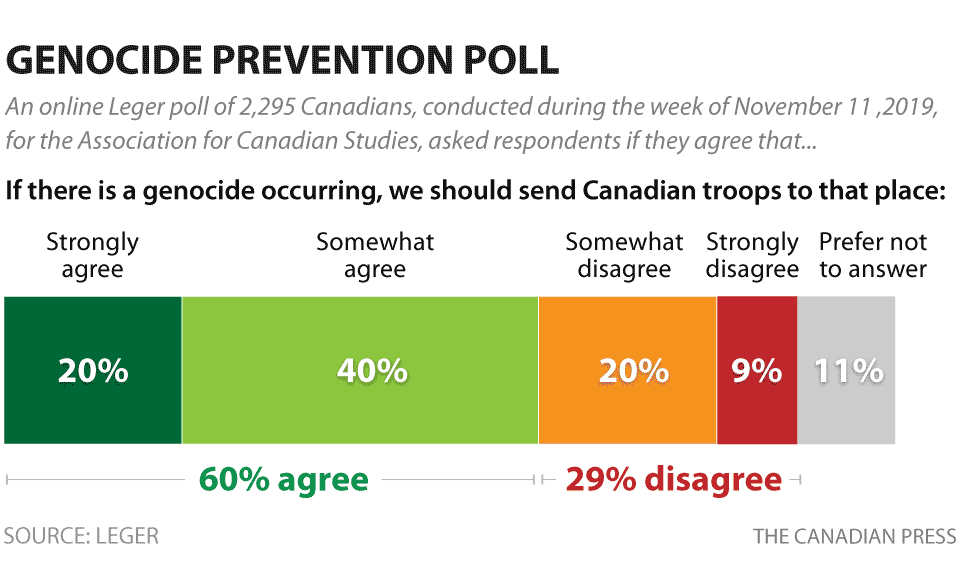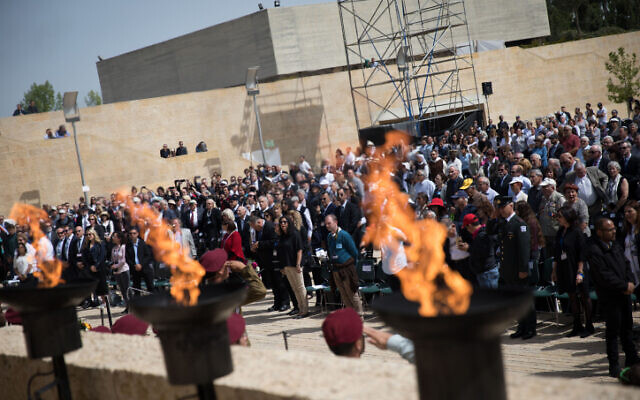Standing By : The Banality of Evil
"All this is very unfortunate because the lessons of what transpired 75 years ago -- as we're on the verge of marking the liberation of Auschwitz -- the lesson is that those people were victims of the most horrific crime of the 20th century because there were lots of bystanders."
"There are a number of people [responding to the poll] who say that these situations are not our business."
Jack Jedwab, president, Association for Canadian Studies
 |
An online survey conducted in November of 2019, the very day that Canada and much of the rest of the world pauses to reflect during what we call Remembrance Day, the sacrifices made by our armed forces service member during world wars, resulted in some surprising responses. All the more surprising when November 11 is a time of reflection, of remembering, of sadness and resolution. Yet, from the results of the poll it appears that a goodly segment of the population considers the conflict that drew much of the free world into an Allied response to Nazi Germany's Axis coalition a relic of the past, not of great interest to them.
It's true, of course, that it is the losses of Canada's military service members that is mourned on Remembrance Day, along with the celebration of their hard-won victories over the evil that loomed its ugly threat over freedom. But the Second World War is also inextricably linked with the deaths of 70 million combatants and civilians during the course of its six years of devastating bloodshed and destabilization worldwide. Above all, it was the shocking inhumanity of the Third Reich's well groomed architecture of mass extermination of Jews, the world's first recognized genocide that rocked the world's conscience.
A world that, despite furtive news reports of mass atrocities preferred to fix its attention elsewhere. And this is precisely what is happening once again. Not our business. Happening somewhere else. No connection with those who are being targeted for annihilation by malign forces of destruction and death. The very disinterest, people preferring to remain oblivious of the horrors being perpetrated on others, looking the other way and getting on with their uninterrupted lives is itself a dreadful indictment of human nature.

The Association for Canadian Studies commissioned the poll to be undertaken and it found that 29 percent of respondents failed to agree with the concept that Canada had a humanitarian obligation to send Canadian troops to a foreign geography where a genocide was under way. Another 11 percent preferred to withhold a response to the question of Canada's involvement in an event taking place elsewhere, despite a deliberate effort underway to commit genocide. Former General Romeo Dallaire, must be shuddering in revulsion. His experience, leading a UN mission in Rwanda was first-hand and inhumanely grotesque.
Leger Marketing conducted its survey of 2,295 Canadians, its resulted released at the very time that global leaders will be present at an event to mark the 75th anniversary of the liberation of Nazi death Camp Auschwitz, whose dreaded name is synonymous with the Holocaust during which six million European Jews, men, women, children, the elderly and the most vulnerable in a Europe steeped in antisemitism were exterminated in death camps, worked to death in slave-labour camps, and summarily executed in villages throughout eastern Europe where they had lived for centuries.
 |
| The audience stands for the Israeli national anthem at the end of the memorial ceremony at Yad Vashem Holocaust museum as Israel marks the country's annual Holocaust Remembrance Day, April 12, 2018. (Hadas Parush/Flash90) |
On January 27, the date when in 1945 Soviet troops liberated the Auschwitz camp, world leaders will congregate to re-emphasize 'never again'. According to the Auschwitz Memorial Site and Museum 120 survivors of the camp are expected to attend. It is not a result of ignorance of events of undisputed horror that keeps such a high number of Canadians from supporting military intervention in future genocides, but rather a kind of emotional isolation where a segment of the population prefers to remain uninvolved. As though mass death occurring anywhere is divorced from moral responsibility.
The irony being that it was Canadian auspices that articulated and brought to the United Nations the concept of 'responsibility to protect' populations from violence enacted by their own governments. Some 43 percent of the survey's participants were able to correctly answer the total figure of Jews whose lives were destroyed during the Holocaust; itself rather disappointing, given the universality of the issue and its place in the public spotlight of colossal atrocities the world has seen perpetrated.
On the other hand, perspective is gained when it becomes clear that the results of the survey suggest that participants who disagreed with military intervention to stop a mass slaughter were likelier to embrace anti-immigrant sentiment, and to display a higher distrust of Jews, which translated to language that is more to the point; are fundamentally antisemitic.
Interestingly enough, the youngest respondents taking part in the survey, aged from 18 to 24, were least likely to disagree with sending troops anywhere should a situation similar to the Holocaust take place once again, while they most often, however, preferred to withhold an answer to the question, as well. People aged between 45 to 54 turned out to represent the most likely age-demographic to disagree with sending troops to such troubling locations.
 |
| This photograph taken on December 15, 2019, in Oswiecim, Poland, shows an aerial view of the railway entrance to former German Nazi death camp Auschwitz II – Birkenau with its SS guards tower. (Pablo GONZALEZ / AFP) |
Labels: Auschwitz Liberation, Canada, Genocide, Holocaust, Military, Poll, World War II

<< Home